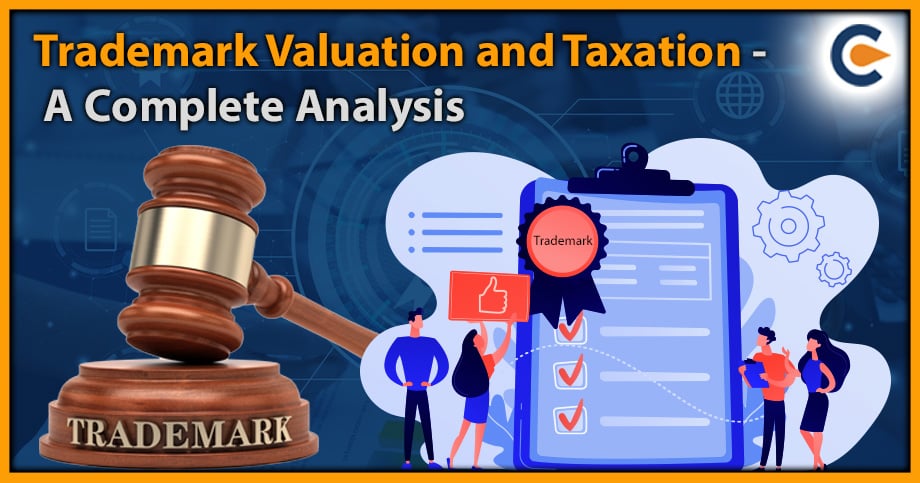A trademark includes symbols, colour, shape, packaging, etc. that encompasses a party’s ability to geographically represent and distinguish that party’s goods or services from others. The use of these marks by the owner without the participation of other persons. Trademarks are an important commercial and economic tool and are typically used extensively to create brand value for a company. Trademark is a set of rights that provides exclusive use to the owner & builds goodwill for the products or services with which it is associated. The Trademark owner can transfer their Trademark rights in the Trademark to others, just list property transfer. Thus, it is considered an intangible asset for a business. In this blog we will discuss Trademark Valuation and Taxation.
What is Trademark Valuation and Taxation?
Let’s discuss the meaning of Trademark Valuation and Taxation:
Trademark Valuation
When it comes to selling or buying a property, the first step is to determine the value of the property in question. Brands are no different! Brand valuation is particularly important because intangible assets are often valued at a higher price than tangible assets.
Price generally boils down to the price the seller intends to sell and the buyer is willing to buy.
When it comes to evaluation, the process is much more complicated than it seems. Sellers often end up in corrections for two reasons. First, to determine the correct value of the existing brand, and second, to find potential buyers willing to buy it at a specified price.
Valuation analysts are often called upon to assist clients with intellectual property matters. These intellectual property issues include: the structuring of sales or licensing transactions.
When it comes to brand valuation, the process is more complicated than it looks. Sellers often find themselves in a dilemma for two reasons:
- Determination of the value of the right to the Mark in the hands;
- Identify potential buyers who want to buy it at the specified price.
How to Know the Value of Your Product?
The value of a brand resides in the goodwill associated with that brand. Goodwill is an intangible asset that forms part of a brand owner’s business value. Assigning a monetary value to goodwill can be quite difficult as there are many variables to consider. For example, reasonable people cannot agree on future business expectations, such as business value opportunities, competitive threats, and market risks that could affect goodwill value and, therefore, brands. Which symbolize this surplus value.
Various Methods of Trademark Valuation
Market Approach Method: Product brands similar to the one under evaluation are researched and compared to determine their value. Sell, buy, franchise, etc. to find a solution here. Studying market information.
Cost Approach Method: This approach consists of listing the costs incurred at the time of the creation and design of the brand. The cost also includes expenses incurred in brand marketing and advertising. It is one of the most common methods for determining the economic value of the brand. The major downside to this method of approach is that it fails to deliver the value associated with brand goodwill.
Future Revenue Approach: This is one of the most preferred and viable methods of arriving at the financial value of a brand. Here, a thorough examination is done to get the future revenue figure that the brand would bring in the coming years based on its current value.
In a business transaction involving the sale of a good, including an intangible such as a trademark, it is important to arrive at an exact price at which the seller is willing to sell it and the buyer is willing to buy within a certain period of time.
However, sellers struggle to find a price to sell the asset and find buyers to buy at that price. Asset valuation can help the buyer determine their approximate value, including brand name, using various valuation methods.
Entrepreneurs or brand owners are often concerned about the value of their brands. Thus, the valuation of brands is of great importance, especially with the increasing number of cases where the value of intangible assets, such as brands, is considered to be higher than that of tangible assets.
Case Law
Brand valuation is a particularly important practice due to an increase in cases where the value of intangible assets such as intellectual property[1] is considered to exceed that of tangible assets, as was the case with Coca-Cola in 2006 In 07, balance sheet capital was $16.92 billion and market capitalization was $124.42 billion. Thus, brands are valued mainly for three reasons:
- Operational objectives (excluding tax).
- Financial accounting assignments, tax purposes.
- This article will focus on the tax aspect of trademark valuation.
Trademark Taxation
Business income and capital gains
In Income Tax Commissioner v M/S Mediworld Publications Pvt Ltd, 2011, the Delhi High Court noted that copyrights, trademarks etc. are subject to taxation.
In addition, Section 2(14) of the Income Tax Act 1961 refers to “fixed capital” and is considered to include intellectual property. In addition, Section 2(11) of the Income Tax Act 1961 states that intellectual property falls within the category of intangible property and contributes to the development of business, generating profits. In addition, Section 28 of the Income Tax Act 1961 also covers the sale of intangible property such as trademarks.
Case Law
Commissioner of income tax c. Maruti Suzuki India Ltd. The Delhi High Court ruled on the aspect of transfer pricing when efforts to promote an associated company significantly increased the value of a brand legally owned by another. . The issue in this case is whether the income derived from the trademark should be attributable to the trademark owner or related entity registered in India.
Intellectual property includes creations of the mind such as inventions; literary and artistic works; buildings; and symbols, names and images used in commerce. As a form of property, intellectual property can be thought of as assets that can be bought, sold, mortgaged, exchanged, and licensed, just like physical property. Intellectual property is protected only if the rights are granted to the producers of the intellectual property. Intellectual property gives individuals, companies or other organizations the right to prevent others from using their creations.
Trade Surcharges Reduce Tax Credits
When granting trademark rights, please note that the licensee’s local royalties are only deductible from income tax or corporation tax as an operating expense, not the German sales tax. In economic terms, 6.25% of the cost of the perpetual transfer of rights (including concessions and licenses, with the exception of licenses which only allow the transfer of acquired rights to third parties) is added to the exchanges. In the case of a sales tax surcharge (§ 8 of the German sales tax law, GewStG), the profits of the company are therefore taxable.
The location/location of the property is required for tax purposes. However, the process of locating intangible assets is complex. In violation of international principles, the Delhi High Court ruled that the location of the owner of the relevant property would be considered the location of an intangible asset whether or not it is registered in India.
Location of an Intangible Asset in Trademark Valuation and Taxation
The identification of a property location is required for taxation purpose. However, the identification process of the location of intangible property is complex. In concurrence with international principles, the High Court of Delhi held that location of the particular property owner would be deemed the location of an intangible asset, regardless of it being registered in India. The Court reached this conclusion through a strict interpretation of Section of the IT Act. The Court held that the non-inclusion of the IPR under the provisions of Section 9 clearly states the intent of legislature not to tax IPR owners located outside India even they earned profits in India via their respective IPR.
Conclusion
The importance of trademark valuation and taxation continues to grow. Differences that exist in Trademark Valuation and Taxation in different jurisdictions make it difficult to find common ground in tax compliance for entities with global liabilities or operations. Such differences can also lead to double taxation.
Also Read:
Monitarization Of Trademark- Is Trademark Saleable In India?
Online Trademark Registration: A Detailed Guide
How Can You Apply For Online Trademark Registration In India?











